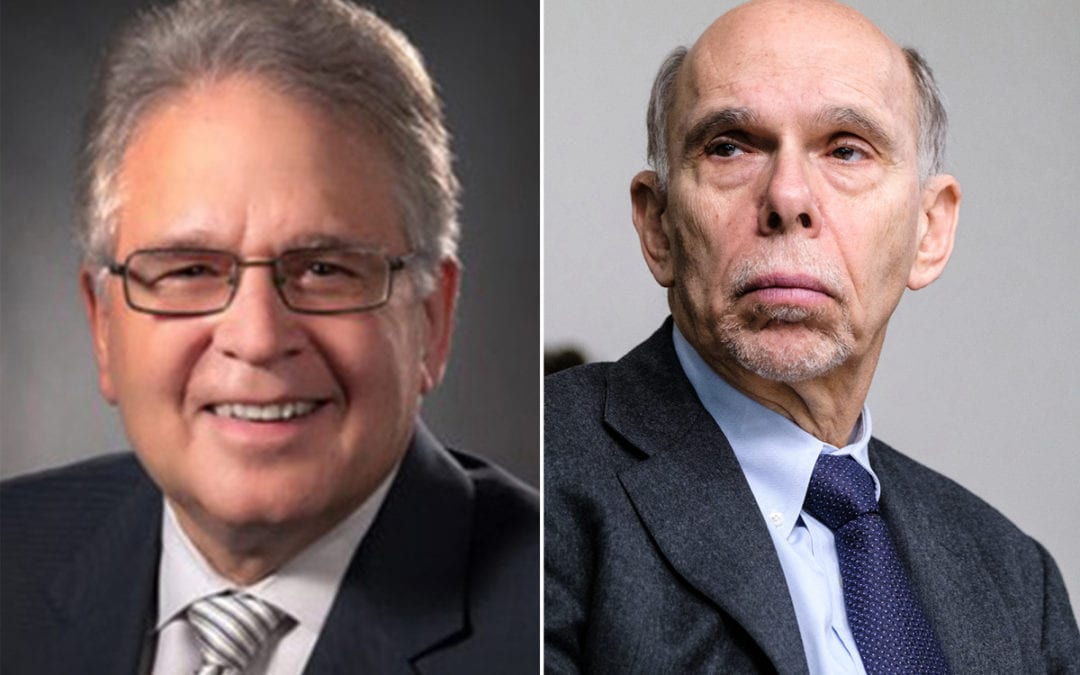While heroic staffers beg for protective equipment and don garbage bags to treat coronavirus patients at a Mount Sinai hospital, two of the system’s top executives are waiting out the public health catastrophe in the comfort of their Florida vacation homes, The Post has learned.
Dr. Kenneth Davis, 72, the CEO of the Mount Sinai Health System who pulled down nearly $6 million in compensation in 2018, is ensconced in his waterfront mansion near Palm Beach.
Davis has been in the Sunshine State for weeks and is joined by Dr. Arthur Klein, 72, president of the Mount Sinai Health Network, who owns an oceanfront condo in Palm Beach.
As the duo work from “home,” the Upper East Side-based hospital system seems to be imploding.
Mount Sinai West assistant nursing manager Kious Kelly succumbed Tuesday to COVID-19; maintenance workers scrambled to create patient pods in the main hospital’s vast lobby to deal with patient overflow, and specialists were called to the front lines to treat the sick.
A photo of nurses at Mount Sinai West near Columbus Circle wearing trash bags because they said there were no more gowns highlighted the dire supply shortage. City Council Speaker Corey Johnson called the photos and situation “shameful and shocking.”
Some nurses continued to say they lacked personal protective equipment Thursday despite claims by the hospital administration, and even Gov. Andrew Cuomo at his daily briefing, that there were enough supplies.
But staffers across the system talked about hospitals under siege.
“People come in, they get intubated, they die, the cycle repeats,” Dr. Steve Kasspidis, of Mount Sinai Queens in Astoria, told Sky News. “The system is overwhelmed all over the place.”
The head of the New York State Nurses Association blasted the ghost leaders.
“How can you inspire confidence in your employees who are in the front lines of the epicenter that you have their best interests at heart when you are 1,000 miles away? Even more important, what are you doing to procure the PPE that is proven to save lives of caregivers and, ultimately, the patients we care for? We are not protected. And every day it is getting worse,” said Judy Sheridan-Gonzalez, the union president.
Davis, reached at his six-bedroom, eight-bathroom home by The Post Friday, said he was told by his own doctor to stay in Florida because he was older than 70. He said he was already there on a fundraising trip for the hospital “before this started.”
But Davis was in New York on March 2 participating in a press conference the day after the city’s first case was announced. A Mount Sinai spokesman said Davis traveled south in early March.
Davis angrily insisted that he did not need to be in the Big Apple, or be with beleaguered staff, to get the job done.
“Do you know that from the time I wake up from the time I go to bed I am totally engaged?” he huffed. “Do you know that I get over 400 emails that I reply to. That on a good day it’s every 90 seconds and that on a bad day it’s almost every minute. That I have teleconferencing with Zoom like constantly. When they don’t have a Zoom, I’m on the phone with them. I mean, please.”
On Thursday he was a featured speaker on a private, digital briefing on the virus outbreak hosted by The Aspen Institute, a Colorado leadership think tank where Davis is a trustee.
Davis said it was also suggested that Klein, because of his age, stay away from the hospital. Klein did not return requests for comment.
Davis said he, along with Klein, were working to get desperately needed gear out of China and had managed to secure 5.5 tons of it to be shipped to the hospital system.
Davis said it was “inappropriate to put peoples’ lives in danger,” and said the hospital leadership needed to be protected to continue to operate the system. He noted that the Yale-New Haven Hospital system told all its employees over 70 to stay home.
Mount Sinai does not have such an age policy. Its website suggests that any employee concerned about being at higher risk from the virus consult their manager.
The leaders at most of the city’s other top hospital systems have been front and center addressing employees and the public.
Michael Dowling, the 70-year-old head of Northwell Health, the state’s largest healthcare system which runs Lenox Hill Hospital in Manhattan, goes into the office, has visited ER workers and given media briefings.
Dr. Laura Forese, 58, the COO of the New York-Presbyterian system, does daily video updates to staff from a hospital building and Thursday was joined by CEO Dr. Steven Corwin, 64.
Dr. Mitchell Katz, 60, the head of the city’s public hospital system, regularly joins Mayor Bill de Blasio at press conferences. And Dr. Robert Grossman, 72, the head of NYU Langone is actively engaged in NYC.
James Tisch and Richard Friedman, the chairmen of the Mount Sinai board, said in a statement they backed Davis, calling him “an incredibly hard working and committed leader in the world of healthcare.”
“He successfully led us through Superstorm Sandy, the Ebola crisis, the 2008 financial crisis and recession, turned our system from the verge of bankruptcy into one of the world’s leading healthcare systems and he will lead us through this crisis,” they said. “Any suggestion that he has not been personally engaged on every issue and working around the clock for his system and his staff is absolutely incorrect.”
Davis, a psychiatrist and neurobiologist who was an early Alzheimer’s disease researcher, has been president of the hospital system since 2003. In 2017, he received $10 million in a reported retirement payout.
In addition to his $2.6 million Florida home, he owns a $2 million home in Syosset, Long Island, and a sprawling $7 million residence in Aspen, public records show.
Larry Marano
This content was originally published here.

